Research historical stories that matter to you to create your own meaningful MicroWorld.
The MicroWorlds Lab welcomes students from across Duke to participate — as little or as much as suits you.
How can you get involved?
You can enroll in a lab course, visit the lab for fun and useful workshops, join a research group, apply for a $500 research stipend, attend a public event, or use the lab’s resources to dive deep into a project you have to do for another class. You can even invent your own collaborative MicroWorlds project with friends.
What is a MicroWorld?
A microworld involves something singular, specific, unique — the world of experience of an individual or group of connected individuals at a particular moment in time. It’s a slice of intimately lived history, a personal story that reveals hidden details of the past — conflicts or beliefs or values — that broad histories can often glide over or smother.
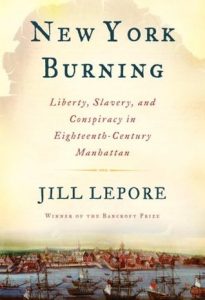 You can build a microworld from a person or group of people, but also from a single object or event, making that object or event the center of your microhistorical analysis. Duke students have crafted microworlds from a missionary’s journal entry in Zululand, a Klan meeting in 1868 North Carolina, a trial of the Talmud in 1240 Paris, the charter of a monastery, a knife attack on a National Gallery painting, an Ohio school attendance lawsuit, a crime following a London opera premier, a seaman’s journal intercepting slave ships, a 1791 political cartoon, a woman courtier’s book about an Afghan sultan, a Turkish trial of an author, the premier of a Louis XIV play, a medieval missionary’s letters about friendship, a Roman trial of a Christian martyr, and more.
You can build a microworld from a person or group of people, but also from a single object or event, making that object or event the center of your microhistorical analysis. Duke students have crafted microworlds from a missionary’s journal entry in Zululand, a Klan meeting in 1868 North Carolina, a trial of the Talmud in 1240 Paris, the charter of a monastery, a knife attack on a National Gallery painting, an Ohio school attendance lawsuit, a crime following a London opera premier, a seaman’s journal intercepting slave ships, a 1791 political cartoon, a woman courtier’s book about an Afghan sultan, a Turkish trial of an author, the premier of a Louis XIV play, a medieval missionary’s letters about friendship, a Roman trial of a Christian martyr, and more.
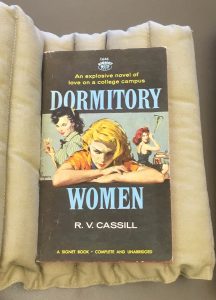
Have you glimpsed a treasure that intrigues you in Duke’s David M. Rubenstein Rare Book and Manuscript Library or Nasher Museum of Art? Use it to build your own historical microworld. Gay pulp fiction novels, letters from North American teachers in Argentina, and an intricate ivory carving made for personal prayer have all inspired microworlds.
Discovering and researching a microworld can lead to a term paper, an article, a chapter, a film, a work of fiction, or a history book. Ultimately microhistory is a way for you, as a historian, to tell a tale imbued with meaning about the human experience.
Talk with a lab faculty member or graduate student fellow about your interests. You can also ask a faculty member to sponsor a research independent study. Independent study projects often develop out of an interesting topic you discover in a class but haven’t the time to dig into deeply enough, and they’re great beginning points for senior honors projects.
Bonus! The MicroWorlds Lab has a dedicated Teaching Assistant to help students working on individual or group projects in the lab. The TA for Fall 2019 is Avrati Bhatnagar (avrati.bhatnagar@duke.edu).
Summer 2020 Undergraduate Student Fellows
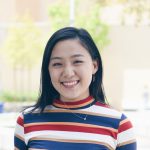
Angela Chung is a rising sophomore at Duke University with plans to major in International Comparative Studies. Her academic interests trace the intersections of media and race in history, with specific focuses on Asian-American experience. This project is a continued effort to look at how visual elements (photos, videos) of the news shaped the racialized narrative (of Black vs Asian vs white) of the 1992 Los Angeles Riots. With the recent upsurge in the Black Lives Matter movement and anti-Asian sentiment from COVID-19, she hopes that this research can be used as a basis for understanding the media’s role in the cross-racial relationships paralleled today. In her free time she enjoys reading and listening to Frank Ocean; on campus, her favorite spot to do both is in Bella Union with a cup of warm Thai milk tea.
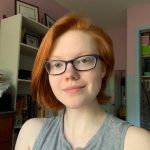 Lindsay Dial a rising sophomore from Cary, North Carolina. She plans to major in Linguistics and German and pursue a minor in either Computer Science or Medieval and Renaissance Studies. Lindsay discovered my interest in Medieval and Renaissance Studies through Professor Robisheaux’s FOCUS cluster and loved the experience. She is a member of Duke Club Ballroom Dance, loves to cross-stitch, and am passionate about political activism.
Lindsay Dial a rising sophomore from Cary, North Carolina. She plans to major in Linguistics and German and pursue a minor in either Computer Science or Medieval and Renaissance Studies. Lindsay discovered my interest in Medieval and Renaissance Studies through Professor Robisheaux’s FOCUS cluster and loved the experience. She is a member of Duke Club Ballroom Dance, loves to cross-stitch, and am passionate about political activism.
 Tessa Delgo is a rising sophomore from Dunedin, Florida. She hasn’t settled on any majors yet, but she is deeply interested in the roles that visual arts play in human development and the development of human cultures. Specifically, she’s been thinking a lot about how different cultures develop standards for what is considered “beautiful” and how those standards contribute to social inequalities. This interest, combined with growing up in a Filipinx-American family, led to her research topic for this summer. She will be looking at the history and role of skin whitening within the Filipinx diaspora and its relationship to institutionalized anti-Blackness in Filipinx culture, as well as the counter-movements that have sprung up to fight against it.
Tessa Delgo is a rising sophomore from Dunedin, Florida. She hasn’t settled on any majors yet, but she is deeply interested in the roles that visual arts play in human development and the development of human cultures. Specifically, she’s been thinking a lot about how different cultures develop standards for what is considered “beautiful” and how those standards contribute to social inequalities. This interest, combined with growing up in a Filipinx-American family, led to her research topic for this summer. She will be looking at the history and role of skin whitening within the Filipinx diaspora and its relationship to institutionalized anti-Blackness in Filipinx culture, as well as the counter-movements that have sprung up to fight against it.
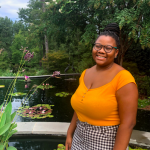 Kelis Johnson is a rising junior from Atlanta, Georgia. She is double majoring in psychology and philosophy with a certificate in Philosophy, Politics, and Economics. She is interested in studying memory and experience and its connection to social change and decision-making, as it relates to applications in education, social movements, and law. Her research project hopes to track how life experiences impact the development of theories of personal identity and in turn how people use those theories to develop opinions about methods of bringing about social change. Specifically, she hopes to investigate the ideals of an African-American woman immersed in the Civil Rights Movement to amplify her voice and provide insight into that time period and today’s movements.
Kelis Johnson is a rising junior from Atlanta, Georgia. She is double majoring in psychology and philosophy with a certificate in Philosophy, Politics, and Economics. She is interested in studying memory and experience and its connection to social change and decision-making, as it relates to applications in education, social movements, and law. Her research project hopes to track how life experiences impact the development of theories of personal identity and in turn how people use those theories to develop opinions about methods of bringing about social change. Specifically, she hopes to investigate the ideals of an African-American woman immersed in the Civil Rights Movement to amplify her voice and provide insight into that time period and today’s movements.
 Maddie Fowler is a rising senior from Chapel Hill, North Carolina. She studies a Program II major in Disability Studies and Ethical Mental Health Care. Maddie loves hiking and playing the piccolo during Duke Basketball games. In the future, she hopes to advocate for disability justice and gender equality and perform Medical Humanities research. Maddie is researching the role of women in the electrification of the rural United States. She is using papers held in the National Museum of American History from Louisan Mamer, who was a home economist hired by the Rural Electrification Administration to encourage electric appliance usage in the home by farmers’ wives. Through the story of Louisan Mamer, Maddie will explore how women’s roles expanded and changed during the rural electrification period.
Maddie Fowler is a rising senior from Chapel Hill, North Carolina. She studies a Program II major in Disability Studies and Ethical Mental Health Care. Maddie loves hiking and playing the piccolo during Duke Basketball games. In the future, she hopes to advocate for disability justice and gender equality and perform Medical Humanities research. Maddie is researching the role of women in the electrification of the rural United States. She is using papers held in the National Museum of American History from Louisan Mamer, who was a home economist hired by the Rural Electrification Administration to encourage electric appliance usage in the home by farmers’ wives. Through the story of Louisan Mamer, Maddie will explore how women’s roles expanded and changed during the rural electrification period.
 Hannah Thurston is a rising junior from London, England majoring in History with a Political Science minor and a certificate in Markets and Management. Discovering her grandmother’s Second World War diaries sparked an interest in women’s experiences in the war and therefore, is excited that the MicroWorlds Lab gives her the opportunity to delve deeper into this topic. She is a member of the Women’s Varsity Lacrosse Team and has a passion for understanding how European political history shapes modern policy.
Hannah Thurston is a rising junior from London, England majoring in History with a Political Science minor and a certificate in Markets and Management. Discovering her grandmother’s Second World War diaries sparked an interest in women’s experiences in the war and therefore, is excited that the MicroWorlds Lab gives her the opportunity to delve deeper into this topic. She is a member of the Women’s Varsity Lacrosse Team and has a passion for understanding how European political history shapes modern policy.
 Catherine Martinez is a rising senior from Miami, Florida studying Public Policy, International Comparative Studies, and Markets & Management. As a daughter of Honduran immigrants, she is interested in pursuing research related to U.S. imperialistic intervention policies that have affected the social, political, and economic state of the Northern Triangle of Central America. Her interests include race relations, capitalism driven exploitation, and migration. Such topics are the main factors in her research that inform contemporary immigration dynamics between the aforementioned region and the U.S. Catherine looks forward to learning and working her final year as a MicroWorlds, Mellon Mays, NC Civic, and PEP fellow.
Catherine Martinez is a rising senior from Miami, Florida studying Public Policy, International Comparative Studies, and Markets & Management. As a daughter of Honduran immigrants, she is interested in pursuing research related to U.S. imperialistic intervention policies that have affected the social, political, and economic state of the Northern Triangle of Central America. Her interests include race relations, capitalism driven exploitation, and migration. Such topics are the main factors in her research that inform contemporary immigration dynamics between the aforementioned region and the U.S. Catherine looks forward to learning and working her final year as a MicroWorlds, Mellon Mays, NC Civic, and PEP fellow.
Spring 2020 Undergraduate Student Fellows

Angela Chung is is a first-year student hailing from Southern California. With writing and curiosity for history central to her academic interests, the MicroWorlds Fellowship was a natural stepping stone in her time at Duke. Angela plans to study International Comparative Studies and to pursue a Policy Journalism and Media Studies Certificate. Her focuses are mainly race relations, Asian-American experience, institutionalized disparities, and counterculture. She hopes to be able to combine historical research and critical writing in the form of journalism to magnify suppressed voices and educate the public.
 Cameron DeChurch is a first-year student at Duke from Winter Park, Florida. Although he is unsure of his exact major, he is pursuing Psychology, Economics, and History. Cameron’s desire to connect with his Italian heritage has led him to interest in the lives of the Florentines. He was in the Renaissance Focus Cluster with Professor Robisheaux and it was an incredible experience. Cameron loves traveling because it allows him to visit places he has studied, and immerse himself into new ways of living. He is on the Duke Men’s Rowing Team and is an avid fisherman.
Cameron DeChurch is a first-year student at Duke from Winter Park, Florida. Although he is unsure of his exact major, he is pursuing Psychology, Economics, and History. Cameron’s desire to connect with his Italian heritage has led him to interest in the lives of the Florentines. He was in the Renaissance Focus Cluster with Professor Robisheaux and it was an incredible experience. Cameron loves traveling because it allows him to visit places he has studied, and immerse himself into new ways of living. He is on the Duke Men’s Rowing Team and is an avid fisherman.
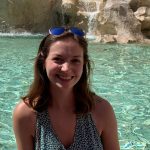 Amber Lemmons is a rising junior from Frankfort, Illinois. She is majoring in International Comparative Studies with a concentration on Latin America and a certificate in human rights. Amber really enjoyed working with the MicroWorlds Lab because of the supportive community and learned a lot about researching and the power of primary sources.
Amber Lemmons is a rising junior from Frankfort, Illinois. She is majoring in International Comparative Studies with a concentration on Latin America and a certificate in human rights. Amber really enjoyed working with the MicroWorlds Lab because of the supportive community and learned a lot about researching and the power of primary sources.
 Lindsay Dial a rising sophomore from Cary, North Carolina. She plans to major in Linguistics and German and pursue a minor in either Computer Science or Medieval and Renaissance Studies. Lindsay discovered my interest in Medieval and Renaissance Studies through Professor Robisheaux’s FOCUS cluster and loved the experience. She is a member of Duke Club Ballroom Dance, loves to cross-stitch, and am passionate about political activism.
Lindsay Dial a rising sophomore from Cary, North Carolina. She plans to major in Linguistics and German and pursue a minor in either Computer Science or Medieval and Renaissance Studies. Lindsay discovered my interest in Medieval and Renaissance Studies through Professor Robisheaux’s FOCUS cluster and loved the experience. She is a member of Duke Club Ballroom Dance, loves to cross-stitch, and am passionate about political activism.
Spring 2019 Undergraduate Student Fellows
Melisa Castillo
Rayhan Jhanji
Lexi Kadis
Sangjie Zhaxi
